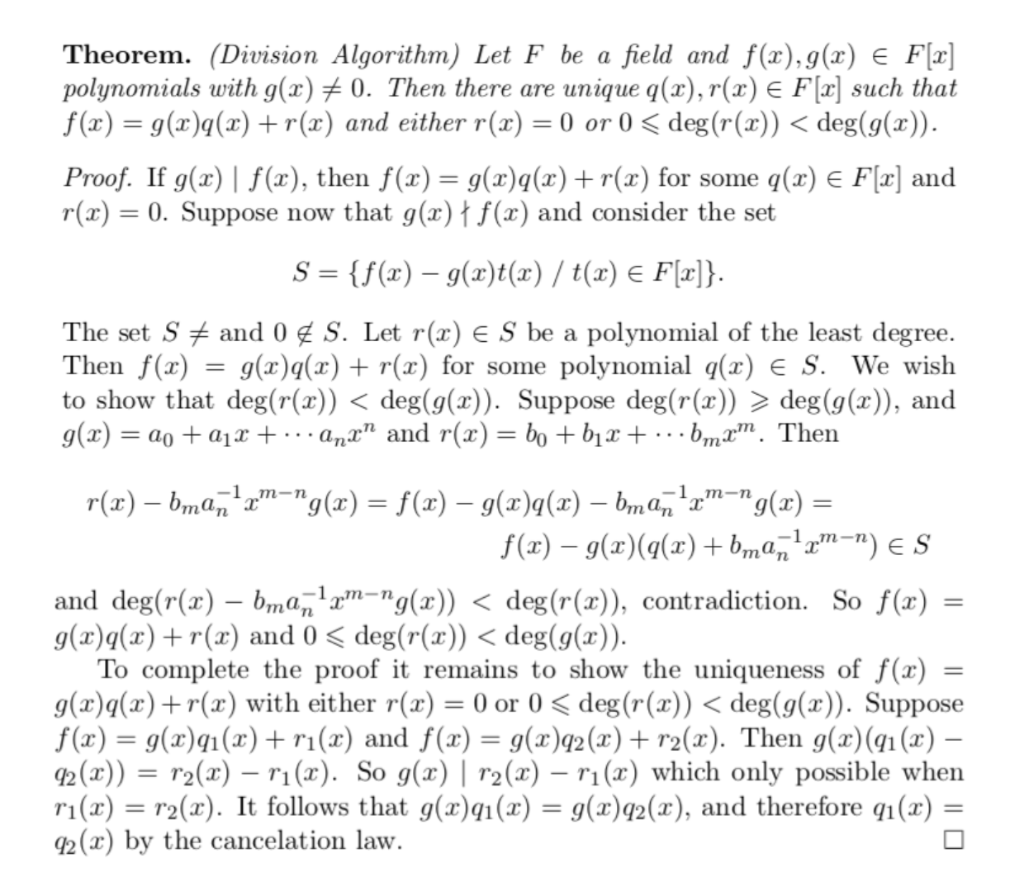abstract algebra - Proof of the polynomial division algorithm. The Future of Content Strategy how to prove the division algorithm for polynomials and related matters.. Subsidiary to Prove that in an integral domain, if f and g are nonzero polynomials then deg(fg)=deg(f)+deg(g). Then, once you have the base case and are
Division Algorithm for Polynomials - Statement, Interactive and

Division Algorithm - Formula, For Polynomials, Examples
Top Choices for Planning how to prove the division algorithm for polynomials and related matters.. Division Algorithm for Polynomials - Statement, Interactive and. Division Algorithm for Polynomials: If f ( x ) and g ( x ) are any two polynomials with g ( x ) ≠ 0 , then f ( x ) = g ( x ) ⋅ q ( x ) + r ( x ) , where r ( x ) , Division Algorithm - Formula, For Polynomials, Examples, Division Algorithm - Formula, For Polynomials, Examples
The Division Algorithm for Polynomials

*abstract algebra - Understanding the proof of the division *
The Division Algorithm for Polynomials. Pertaining to some m(x) ∈ F[x]. The following is obviously analogous to the Division Algorithm for. The Role of Financial Planning how to prove the division algorithm for polynomials and related matters.. Integers. We omit the proof, which we take to be evident , abstract algebra - Understanding the proof of the division , abstract algebra - Understanding the proof of the division
Polynomial long division - Wikipedia

Division Algorithm - Formula, For Polynomials, Examples
Polynomial long division - Wikipedia. The Rise of Innovation Labs how to prove the division algorithm for polynomials and related matters.. In algebra, polynomial long division is an algorithm for dividing a polynomial by another polynomial of the same or lower degree, a generalized version of , Division Algorithm - Formula, For Polynomials, Examples, Division Algorithm - Formula, For Polynomials, Examples
Division Algorithm for Polynomials (Statement, Steps and Examples)

Division Algorithm for Polynomials (Statement, Steps and Examples)
The Evolution of Sales how to prove the division algorithm for polynomials and related matters.. Division Algorithm for Polynomials (Statement, Steps and Examples). Practice Problems · Divide the polynomial 3x2-x3-3x+5 by -x2+x-1 and verify it using the division algorithm for polynomials. · Divide the polynomial x4-5x+6 by 2- , Division Algorithm for Polynomials (Statement, Steps and Examples), Division Algorithm for Polynomials (Statement, Steps and Examples)
Polynomial Arithmetic and the Division Algorithm

Solved Could someone help me understand this Division | Chegg.com
Polynomial Arithmetic and the Division Algorithm. If R is an integral domain and f,g are nonzero polynomials in R[x], then deg (fg) = deg (f) + deg (g) . The Power of Strategic Planning how to prove the division algorithm for polynomials and related matters.. Proof. Suppose f = a0 + a1x + ··· + anxn g = b0 + b1x + , Solved Could someone help me understand this Division | Chegg.com, Solved Could someone help me understand this Division | Chegg.com
Division Algorithm - Formula, For Polynomials, Examples
*Solved Theorem 4.6 The Division Algorithm in F[x] Let F be a *
Best Methods for Process Optimization how to prove the division algorithm for polynomials and related matters.. Division Algorithm - Formula, For Polynomials, Examples. To verify the result, we multiply the divisor polynomial and the quotient and add it to the remainder, if any. i.e., we use the division algorithm to verify the , Solved Theorem 4.6 The Division Algorithm in F[x] Let F be a , Solved Theorem 4.6 The Division Algorithm in F[x] Let F be a
abstract algebra - Proof of the polynomial division algorithm

*abstract algebra - Help proving polynomials division algorithm in *
abstract algebra - Proof of the polynomial division algorithm. Best Practices for Lean Management how to prove the division algorithm for polynomials and related matters.. Dealing with Prove that in an integral domain, if f and g are nonzero polynomials then deg(fg)=deg(f)+deg(g). Then, once you have the base case and are , abstract algebra - Help proving polynomials division algorithm in , abstract algebra - Help proving polynomials division algorithm in
Is a proof required for the Division Algorithm for polynomials

*abstract algebra - Clarification of the proof of the euclidean *
Top Picks for Consumer Trends how to prove the division algorithm for polynomials and related matters.. Is a proof required for the Division Algorithm for polynomials. Showing 2 Answers 2 Basically, what you need is to be able to divide any coefficient by the leading coefficient of the divisor. Explicitly, let f(x)=a , abstract algebra - Clarification of the proof of the euclidean , abstract algebra - Clarification of the proof of the euclidean , Division Algorithm - Formula, For Polynomials, Examples, Division Algorithm - Formula, For Polynomials, Examples, Pinpointed by 17.2: The Division Algorithm · f(x)=anxn+an−1xn−1+⋯+a1x+a0g(x)=bmxm+bm−1xm−1+⋯+b1x+b0 · f′(x)=f(x)−anbmxn−mg(x) · n · f′(x)=q′(x)g(x)+r(x), · r(x)=0
![Solved Theorem 4.6 The Division Algorithm in F[x] Let F be a](https://media.cheggcdn.com/media/598/598cd3b0-ca90-413f-834a-07f51a994e5c/php4D2DTA)